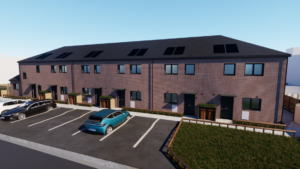Better connected
 Matt Leach has become skeptical of government’s ability to make a real impact on a local level. But the new boss of Hact is sold on the Big Society agenda and reckons housing providers should be at the heart of it. Clare Goff meets him
Matt Leach has become skeptical of government’s ability to make a real impact on a local level. But the new boss of Hact is sold on the Big Society agenda and reckons housing providers should be at the heart of it. Clare Goff meets him
‘I’ve been on a journey that started in central government but which has gradually taken me closer and closer towards frontline delivery.’
Matt Leach is two and a half weeks into his new role as chief executive of housing action charity Hact when I meet him in his central London office. It’s late-August and he’s taking the opportunity of the slight lull in proceedings during the holiday period to reflect on a career that began at the heart of government – as private secretary to housing minister Nick Raynsford and as writer of the Queen’s Speech – and has seen him gradually move further out and closer towards the community level. It’s a journey during which his faith in the role of the public sector in solving entrenched social problems has diminished.
‘The longer I worked in central government the more I became aware of the extent to which government on its own didn’t have the answer or the tools to make a difference to people’s lives,’ he says. ‘Real differences are made by people on the ground doing stuff. I have scepticism about what government on its own can do and much more belief in what communities can do by themselves.’
He joins Hact in its 51st year and, he says, at a time when the conditions for housing providers are similar to those in the year of its birth. ‘Hact was formed at a time when there was limited or no government funding for housing organisations and limited or no regulation. The sector had to work together to achieve those things. Now we’re at a time where some of those challenges are re-emerging.’
RECONNECTING WITH THE HOUSING ASSOCIATION SECTOR
In his new role Leach plans to strengthen Hact’s historic relationship with the housing association sector. The charity began life in 1960 as the Housing Association Charitable Trust, set up by the National Federation of Housing Societies – now the National Housing Federation – and chaired by Parker Morris.
Its initial role was as an intermediary helping new housing associations to secure funding and to grow and develop. During the 60s and 70s many of the housing sector’s most prominent players were nurtured and supported by Hact, including Circle 33 Housing Trust and Liverpool Housing Trust. In the 80s Hact responded to inner city riots across the country with funding and support for BME housing provision.
Throughout its history it has maintained its position as an intermediary, partnering with groups working with the most marginalised in society. Today, while it maintains strong links with refugee groups and homeless organisations, it has had less contact in recent years with the, now large and mainstream, housing association sector. One of Leach’s key aims as chief executive is to reconnect Hact with mainstream housing providers as social housing provision enters a new era.
‘Hact has done some great work in the past, but I think it would be fair to suggest that we haven’t always been as successful as we might over recent years in connecting those projects into the mainstream of the housing sector. If you want to achieve change, you need to ensure you are building partnerships at the heart of the sector, not just the margins.’

Matt Leach with a volunteer from Reach In, a HACT project which provides housing placements for refugees
AT THE CROSSROADS
The current challenges for the housing association movement were set out in a paper he co-authored earlier this year, in his previous role as associate director at think tank Respublica. Called At the Crossroads: A Progressive Future for Housing Associations, it sets out a vision of housing providers as anchors within their communities. As the government retreats from funding, housing providers will find themselves with deteriorating income streams and will need to find a new purpose and new sources of income, it says.
It calls on government to set housing associations free from regulation, allowing them to innovate and become more accountable to the communities in which they are based. The successful housing providers of the future will be those that have the ability to engage with a multitude of partners at the local level and help communities work through the new localist agenda.
‘For those associations that aspire to develop a community role at the heart of the Big Society, and wish to contribute to a new civil economy focused on community, neighbourhood and localism, and for a government that shares that vision, the challenge and opportunity is there,’ the report says.
Housing associations are a
‘mature and consolidated version
of Big Society’
As not for profit organisations working in the most difficult communities delivering vital public services in partnership with local and national government, housing associations are, says Leach, a ‘mature and consolidated version of Big Society’.? As such, he says, the sector ‘should have confidence to assert that and be willing to draw lessons that the rest of civil society can learn from’.
The recent riots offer a challenge to housing providers to re-assess their role in communities and think about how they can work more closely with those they house, he says.? Many associations, such as the partnership between Hyde Housing and Lloyds TSB and those registered social landlords linked to Fair Finance, are working with tenants on financial inclusion issues, helping households to manage their income.
Others, like Trent & Dove, a Staffordshire based housing association, have set up careers services for tenants, including paid placements for young unemployed people. As the localism agenda rolls out, housing associations can play a key role in harnessing the energy of the communities.
The report set out five key areas in which housing associations can build capacity and develop new approaches: as enablers, investors, active funders, broader service providers and supporters of local co-operation and self-help.
Hact’s role has always been as an intermediary, bringing partners together at a local level and helping groups to gain funding and expand their role. Going forward it will continue to support and develop those organizations and housing providers working closest to communities and developing new approaches. It currently has a strong partnership with Self-Help Housing, which has just secured funding for the coming year.
A BIG SOCIETY JOURNEY
But is the housing association sector ready for the changes that are coming? Leach has had good feedback from the sector so far and is seeing great examples of change. Hanover, for example, now procures from a local level rather than nationally. Housing associations are very well-placed to respond to a world in which government plays a lesser role, he says, and he’s well-placed to help them on their Big Society journey.
For, despite the turbulence of Big Society’s first year, he remains an advocate. His most recent position prior to Hact was as associate director and head of its health, housing and environment unit at Respublica, the think tank set up by Philip Blond which has been at the forefront of the debate around Big Society. ?He left Respublica at a time when the Big Society concept was struggling for its survival, but he’s still a believer.
‘One shouldn’t underestimate the impact that Big Society has had. Whilst government may have had problems selling it as a slogan, particularly at a time of cuts in public spending, the core principles underpinning it as an idea are absolutely right – we need to build the strength of civil society and harness the potential of not for profit organisations as agents of change and vehicles for delivering public services in partnership with communities.’
He admits that government has struggled to communicate it against a backdrop of austerity and cuts but says Big Society cannot be judged on its first year.?‘It’s about a long-term cultural change by government, by organisations that work with government, and by communities as well.
‘If it’s to have value it must be about changing expectations, relationships and ways of behaving in the long term. There are limits to what government can do, and economic and demographic pressures may impose greater constraints in the future.
‘We need to build the strength and resilience of communities in the face of those pressures. That has always been part of the historic role of housing providers, and something that will be of increasing importance in the future.’
As he starts the next phase of his journey, Matt Leach is focused on helping communities and housing providers take on the Big Society challenge.















